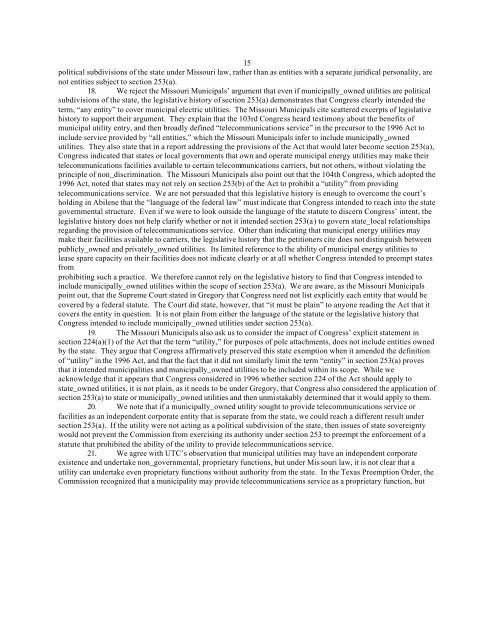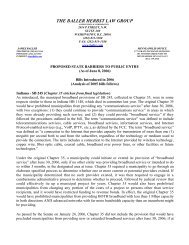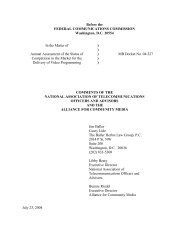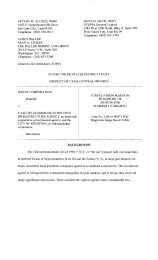Petition for Writ of Certiorari
Petition for Writ of Certiorari
Petition for Writ of Certiorari
You also want an ePaper? Increase the reach of your titles
YUMPU automatically turns print PDFs into web optimized ePapers that Google loves.
15<br />
political subdivisions <strong>of</strong> the state under Missouri law, rather than as entities with a separate juridical personality, are<br />
not entities subject to section 253(a).<br />
18. We reject the Missouri Municipals’ argument that even if municipally_owned utilities are political<br />
subdivisions <strong>of</strong> the state, the legislative history <strong>of</strong> section 253(a) demonstrates that Congress clearly intended the<br />
term, “any entity” to cover municipal electric utilities. The Missouri Municipals cite scattered excerpts <strong>of</strong> legislative<br />
history to support their argument. They explain that the 103rd Congress heard testimony about the benefits <strong>of</strong><br />
municipal utility entry, and then broadly defined “telecommunications service” in the precursor to the 1996 Act to<br />
include service provided by “all entities,” which the Missouri Municipals infer to include municipally_owned<br />
utilities. They also state that in a report addressing the provisions <strong>of</strong> the Act that would later become section 253(a),<br />
Congress indicated that states or local governments that own and operate municipal energy utilities may make their<br />
telecommunications facilities available to certain telecommunications carriers, but not others, without violating the<br />
principle <strong>of</strong> non_discrimination. The Missouri Municipals also point out that the 104th Congress, which adopted the<br />
1996 Act, noted that states may not rely on section 253(b) <strong>of</strong> the Act to prohibit a “utility” from providing<br />
telecommunications service. We are not persuaded that this legislative history is enough to overcome the court’s<br />
holding in Abilene that the “language <strong>of</strong> the federal law” must indicate that Congress intended to reach into the state<br />
governmental structure. Even if we were to look outside the language <strong>of</strong> the statute to discern Congress’ intent, the<br />
legislative history does not help clarify whether or not it intended section 253(a) to govern state_local relationships<br />
regarding the provision <strong>of</strong> telecommunications service. Other than indicating that municipal energy utilities may<br />
make their facilities available to carriers, the legislative history that the petitioners cite does not distinguish between<br />
publicly_owned and privately_owned utilities. Its limited reference to the ability <strong>of</strong> municipal energy utilities to<br />
lease spare capacity on their facilities does not indicate clearly or at all whether Congress intended to preempt states<br />
from<br />
prohibiting such a practice. We there<strong>for</strong>e cannot rely on the legislative history to find that Congress intended to<br />
include municipally_owned utilities within the scope <strong>of</strong> section 253(a). We are aware, as the Missouri Municipals<br />
point out, that the Supreme Court stated in Gregory that Congress need not list explicitly each entity that would be<br />
covered by a federal statute. The Court did state, however, that “it must be plain” to anyone reading the Act that it<br />
covers the entity in question. It is not plain from either the language <strong>of</strong> the statute or the legislative history that<br />
Congress intended to include municipally_owned utilities under section 253(a).<br />
19. The Missouri Municipals also ask us to consider the impact <strong>of</strong> Congress’ explicit statement in<br />
section 224(a)(1) <strong>of</strong> the Act that the term “utility,” <strong>for</strong> purposes <strong>of</strong> pole attachments, does not include entities owned<br />
by the state. They argue that Congress affirmatively preserved this state exemption when it amended the definition<br />
<strong>of</strong> “utility” in the 1996 Act, and that the fact that it did not similarly limit the term “entity” in section 253(a) proves<br />
that it intended municipalities and municipally_owned utilities to be included within its scope. While we<br />
acknowledge that it appears that Congress considered in 1996 whether section 224 <strong>of</strong> the Act should apply to<br />
state_owned utilities, it is not plain, as it needs to be under Gregory, that Congress also considered the application <strong>of</strong><br />
section 253(a) to state or municipally_owned utilities and then unmistakably determined that it would apply to them.<br />
20. We note that if a municipally_owned utility sought to provide telecommunications service or<br />
facilities as an independent corporate entity that is separate from the state, we could reach a different result under<br />
section 253(a). If the utility were not acting as a political subdivision <strong>of</strong> the state, then issues <strong>of</strong> state sovereignty<br />
would not prevent the Commission from exercising its authority under section 253 to preempt the en<strong>for</strong>cement <strong>of</strong> a<br />
statute that prohibited the ability <strong>of</strong> the utility to provide telecommunications service.<br />
21. We agree with UTC’s observation that municipal utilities may have an independent corporate<br />
existence and undertake non_governmental, proprietary functions, but under Mis souri law, it is not clear that a<br />
utility can undertake even proprietary functions without authority from the state. In the Texas Preemption Order, the<br />
Commission recognized that a municipality may provide telecommunications service as a proprietary function, but






